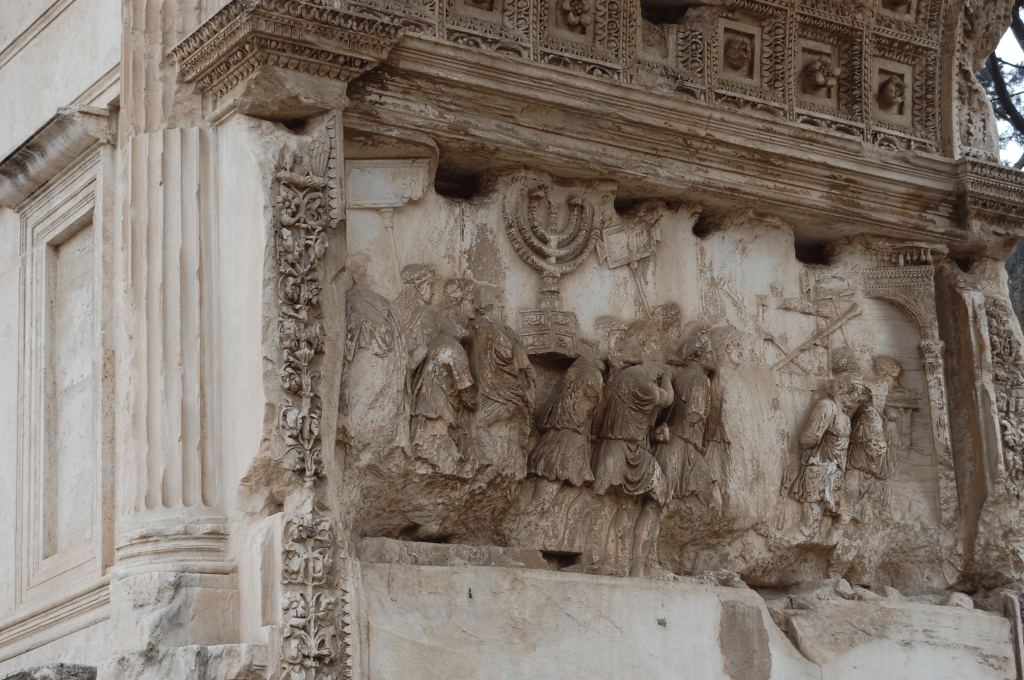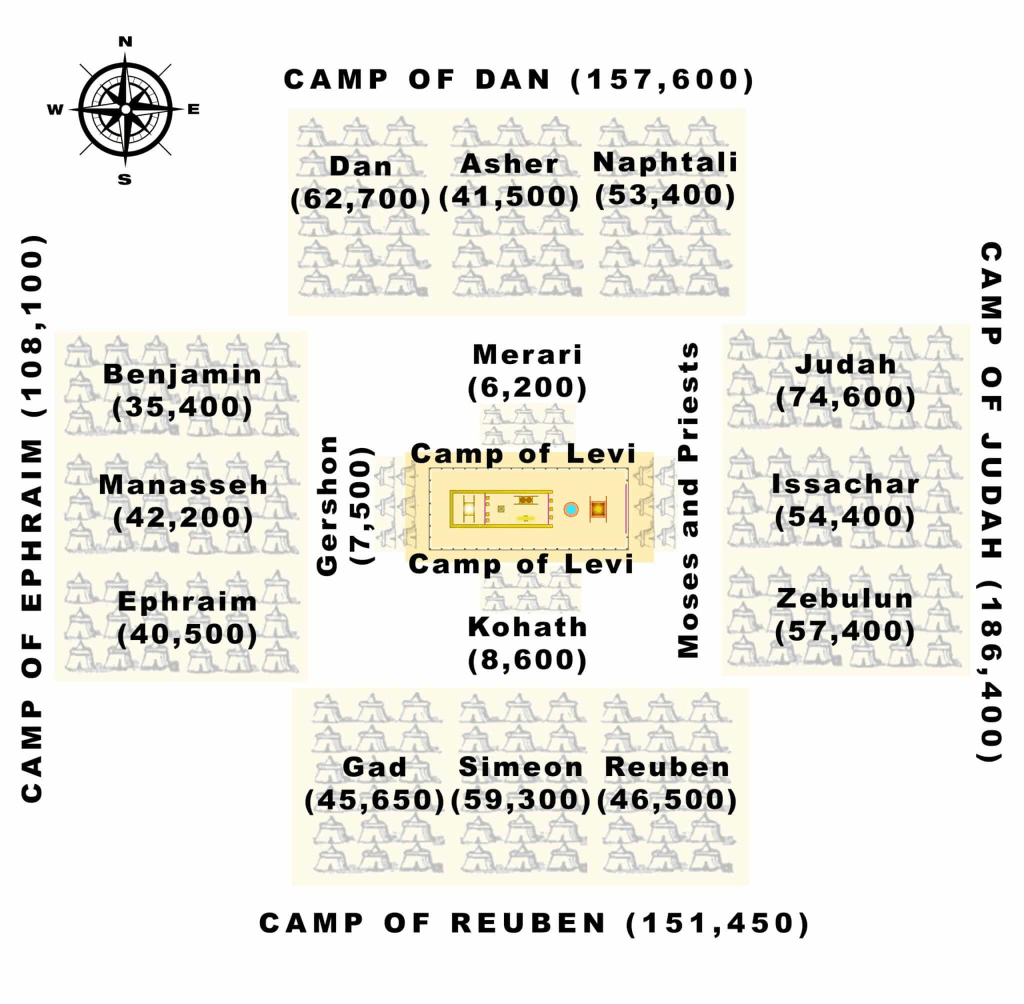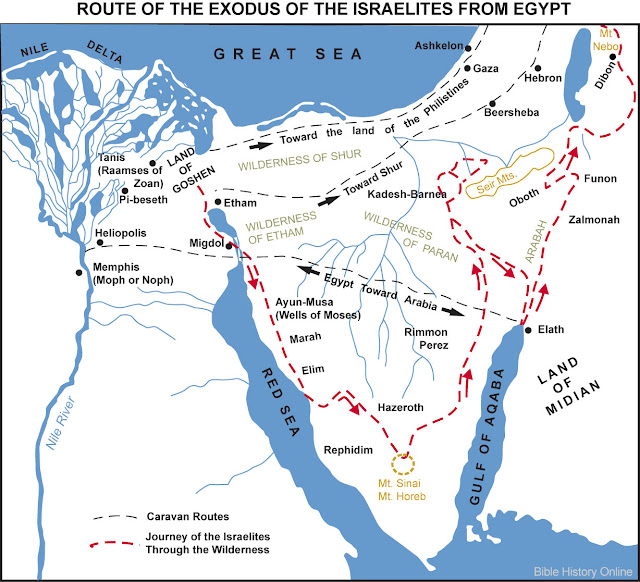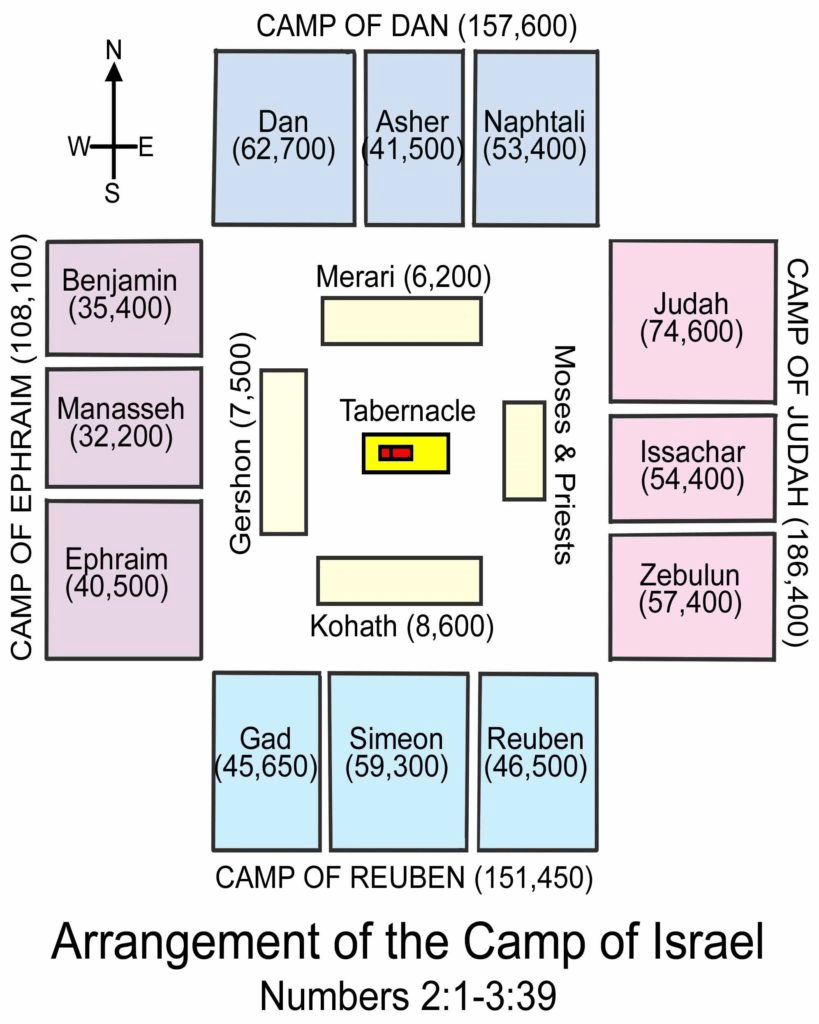Numbers (9-10)
“And upon thy sword shalt thou depend, entering at every place: yet thou shalt be supple and credulous, and be in subjection to thy brother [Jacob]; but it will be that when his sons [the children of Israel] become evil, and fall from keeping the commandments of the law, thou shalt break his yoke of servitude from off thy neck….and then will I kill Jakob my brother,” Genesis 27:41-42 Jonathan
Numbers 9
1 And the Lord spoke unto Moses in the Wilderness of Sinai, in the first month of the second year after they had come out of the land of Egypt, saying,
— in the first month of the second year; the celebration of the Passover, as recorded in this chapter, preceded in order of time the numbering of the people recorded in Numbers 1, and the other events which were connected with it. No provision had hitherto been made for the celebration of the Passover in the wilderness.
2 “Let the children of Israel also keep the Passover at his appointed season. — keep the Passover at his appointed season; being kept in the first month; that is, in spring;
3 In the fourteenth day of this month at evening ye shall keep it in his appointed season. According to all the rites of it and according to all the ceremonies thereof shall ye keep it.” — at evening; which in Hebrew, is ben ha’arbayim “between the two evenings”
— the Orthodox definition of ben ha’arbayim “between the two evenings” is interpreted as “after noon and until nightfall,” the slaying of the lambs was the first of nine ordinances to be fulfilled on the Passover;
4 And Moses spoke unto the children of Israel that they should keep the Passover. — this was the first observance of the passover since the exodus; and without and the Israelites were to keep it till their settlement in the land of Canaan, and beyond;
5 And they kept the Passover on the fourteenth day of the first month at evening in the Wilderness of Sinai. According to all that the Lord commanded Moses, so did the children of Israel. — again at evening; which in Hebrew, is ben ha’arbayim “between the two evenings” that is, “after noon and until nightfall,”
6 And there were certain men who were defiled by the dead body of a man, so that they could not keep the Passover on that day; and they came before Moses and before Aaron on that day. — by the dead body of a man; by the touch of a dead body; who may have died suddenly; and so all were defiled, being in the place where the dead body was, or had touched it;
7 And those men said unto him, “We are defiled by the dead body of a man. Why are we kept back, that we may not offer an offering of the Lord in its appointed season among the children of Israel?” — those certain men; probably Mishael and Elizaphan, who buried their cousins, Nadab and Abihu, within a week of this Passover Leviticus 10:4-5.
8 And Moses said unto them, “Stand still, and I will hear what the Lord will command concerning you.” — Moses told them to wait (stand), and he would hear what the Lord, of whom he would inquire, would command.
9 And the Lord spoke unto Moses, saying,
10 “Speak unto the children of Israel, saying: ‘If any man of you or of your posterity shall be unclean by reason of a dead body, or be in a journey afar off, yet he shall keep the Passover unto the Lord. — If any man of you or of your posterity; be unclean by reason of a dead body, or be in a journey.
11 The fourteenth day of the second month at evening they shall keep it, and eat it with unleavened bread and bitter herbs. — again at evening; which in Hebrew, is ben ha’arbayim “between the two evenings” that is, “after noon and until nightfall,”
12 They shall leave none of it unto the morning, nor break any bone of it. According to all the ordinances of the Passover they shall keep it. — they shall leave none of it unto the morning; none of the flesh of the passover lamb, what was left was to be burnt with fire, Exodus 12:10;
— to make this clearer, “between the two evenings” is from the time when the sun begins to incline towards the west, which is from the sixth hour [noon or 12 o’clock] and onwards. It is erevim [“evenings”] because there are TWO EVENINGS, for “between the two evenings” is from the time that the sun begins to decline as one evening, and the other evening is after the sun has GONE DOWN. It is the space of time in between which is meant by “between the two evenings.”
— for erevs in Orthodox terminology, there are two evenings (erevs), one from the time the sun begins to decline, and the other evening is after the sun has gone down, til midnight.
13 But the man who is clean and is not on a journey, and forbeareth to keep the Passover, even the same soul shall be cut off from among his people, because he brought not the offering of the Lord in its appointed season. That man shall bear his sin.
— the man that forbeareth to keep the passover, through contempt or neglect, without these or any other just impediments, as before; even the same soul shall be cut off from his people; either be excommunicated from them, or cut off by death by the immediate hand of God;
14 And if a stranger shall sojourn among you, and will keep the Passover unto the Lord, according to the ordinance of the Passover and according to the manner thereof, so shall he do. Ye shall have one ordinance, both for the stranger and for him that was born in the land.’”
— if a stranger shall sojourn among you, and will keep the passover; Gentile converts, or proselytes, as they were called, were admitted, if circumcised, to the same privileges as native Israelites, and were liable to excommunication if they neglected the passover.
15 And on the day that the tabernacle was reared up, the cloud covered the tabernacle, namely, the tent of the testimony; and at evening there was upon the tabernacle, as it were, the appearance of fire until the morning. — the erev here is the second evening, that is, after the sun has gone down, til midnight.
16 So it was always: the cloud covered it by day and the appearance of fire by night. — and the appearance of fire by night; when as a cloud it could not be because of the darkness of the night; as in the daytime it could not be discerned as a body of fire or light, because of the light of the sun;
17 And when the cloud was taken up from the tabernacle, then after that the children of Israel journeyed; and in the place where the cloud stood still, there the children of Israel pitched their tents. — and in the place where the cloud abode, there the children of Israel pitched their tents; when it stopped and remained without any motion, it was a signal to the children of Israel to stop also.
18 At the commandment of the Lord the children of Israel journeyed, and at the commandment of the Lord they pitched camp. As long as the cloud stayed upon the tabernacle they rested in their tents; — the motion or stay of the cloud is fitly called the command of God, because it was a signification of God’s will and their duty, which a command properly is;
19 and when the cloud tarried long upon the tabernacle many days, then the children of Israel kept the charge of the Lord and journeyed not. — and when the cloud tarried long upon the tabernacle many days; or years, for days are sometimes put for years, and in some places the cloud tarried several years; or however, if it stayed but a month or a year in any place;
20 And so it was, when the cloud was a few days upon the tabernacle, according to the commandment of the Lord they stayed in their tents, and according to the commandment of the Lord they journeyed.
— the cloud was a few days upon the tabernacle; days which were so few that they might be easily numbered: the Targum of Jonathan interprets them of the seven days of the week, as if the sense was, when the cloud rested a week on the tabernacle;
21 And so it was, when the cloud tarried from evening unto the morning, and the cloud was taken up in the morning, then they journeyed. Whether it was by day or by night that the cloud was taken up, they journeyed. — erev for evening; from even unto the morning; the whole night, during which time they rested in their beds;
22 Or whether it was two days or a month or a year that the cloud tarried upon the tabernacle, remaining thereon, the children of Israel remained in their tents and journeyed not; but when it was taken up, they journeyed.
— or whether it were two days, or a month, or a year, that the cloud tarried upon the tabernacle; sometimes it tarried but half a day, sometimes a whole day, sometimes two days, at other times a whole month, and even a year;
23 At the commandment of the Lord they rested in the tents, and at the commandment of the Lord they journeyed. They kept the charge of the Lord, at the commandment of the Lord by the hand of Moses.
— they kept the charge of the Lord, at the commandment of the Lord by the hand of Moses; observed the rest or motion of the cloud, the order and command of God signified thereby, as it was made known unto them by the ministry and means of Moses.
Numbers 10
1 And the Lord spoke unto Moses, saying,
2 “Make thee two trumpets of silver. Of a whole piece shalt thou make them, that thou mayest use them for the calling of the assembly and for the journeying of the camps. — two trumpets; for Aaron’s two sons; Eleazar and Ithamar, though afterward the number of the trumpets was much increased, as the number of the priests also was.
3 And when they shall blow with them, all the assembly shall assemble themselves to thee at the door of the tabernacle of the congregation. — the trumpet was a straight instrument, differing in this respect from the curved horn or cornet; and is represented, among the other spoils of the temple, on the Arch of Titus;
— all the assembly shall assemble themselves to thee at the door of the tabernacle of the congregation; to hear what was to be said unto them: blowing both the trumpets together was a token that the whole congregation was called to meet together at the tabernacle, the door of which was the usual place of assembling, especially on religious counts, for there also the Lord met them, Exodus 29:42.
4 And if they blow but with one trumpet, then the princes, who are heads of the thousands of Israel, shall gather themselves unto thee. — and if they blow but with one trumpet; with only one of them, or but once, with one sounding, and that an even one as before: then the princes, which are the heads of the thousands of Israel;
5 When ye blow an alarm, then the camps that lie on the east parts shall go forward. — when ye blow an alarm; a sound “tara-tan-tara”
— then the camps that lie on the east parts shall go forward; the camps of Judah, Issachar, and Zebulun, which lay to the east of the tabernacle, at the front of it;
— one of a series of JUDAH FIRST (1) Movement of the Camp, Numbers 2:3; (2) Judah’s First Day to present Offering, Numbers 7:12; (3) Judah first to cross the Jordan River, Jewish Malbim writing.
6 When ye blow an alarm the second time, then the camps that lie on the south side shall take their journey. They shall blow an alarm for their journeys. — when ye blow an alarm the second time; another “tara-tan-tara”
— then the camps that lie on the south side shall take their journey; the camps of Reuben, Simeon, and Gad, which were encamped on the south side of the tabernacle;
7 But when the congregation is to be gathered together, ye shall blow, but ye shall not sound an alarm. — ye shall blow, but not sound an alarm: that is, blow with an even and uninterrupted sound; by which the congregation and camps were distinguished from one another, the same certain sound being given to each constantly;
8 And the sons of Aaron, the priests, shall blow with the trumpets; and they shall be to you for an ordinance for ever throughout your generations. — and the sons of Aaron, the priests, shall blow with the trumpets; as Aaron had only two sons at this time, Eleazar and Ithamar, there was need only of two trumpets;
9 And if ye go to war in your land against the enemy who oppresseth you, then ye shall blow an alarm with the trumpets; and ye shall be remembered before the Lord your God, and ye shall be saved from your enemies. — if ye go to war; in the land of Canaan, either when attacked by foreign invaders or when they went to take possession according to the divine promise;
— against the Kenites and Kenizzites, the Kadmonites, the Hittites and the Perizzites and Rephaim, the Amorites and the Canaanites, the Girgashites and the Jebusites. Genesis 15:19-21
10 Also in the day of your gladness and in your solemn days, and in the beginnings of your months, ye shall blow with the trumpets over your burnt offerings and over the sacrifices of your peace offerings, that they may be to you for a memorial before your God: I am the Lord your God.”
— that they may be to you for a memorial before your God; as it were, to put him in mind of the promises he has made, and the blessings he has laid up as a covenant God for his people;
— I am the Lord your God; who had a right to appoint such things to be observed by them, and by whom, as their covenant God, they were laid under obligation to regard them.
11 And it came to pass on the twentieth day of the second month, in the second year, that the cloud was taken up from the tabernacle of the testimony.
— that the cloud was taken up from off the tabernacle of the testimony; that part of the tabernacle where the ark of the testimony stood, even the most holy place, over which the cloud was, the token of the divine Presence, and which it covered;
— but now was taken up from it, and went up higher above it, and was a signal for the motion of the camps of Israel to set forward in their journey towards the Promised Land.
12 And the children of Israel took their journeys out of the Wilderness of Sinai, and the cloud rested in the Wilderness of Paran.
13 And they first took their journey according to the commandment of the Lord by the hand of Moses.
14 In the first place went the standard of the camp of the children of Judah according to their armies; and over his host was Nahshon the son of Amminadab.
— one of a series of JUDAH FIRST (1) Movement of the Camp, Numbers 2:3; (2) Judah’s First Day to present Offering, Numbers 7:12;
15 And over the host of the tribe of the children of Issachar was Nethaneel the son of Zuar.
16 And over the host of the tribe of the children of Zebulun was Eliab the son of Helon.
17 And the tabernacle was taken down; and the sons of Gershon and the sons of Merari moved forward, bearing the tabernacle. — the sons of Gershon and the sons of Merari; of the sons of Levi;
18 And the standard of the camp of Reuben moved forward according to their armies; and over his host was Elizur the son of Shedeur.
19 And over the host of the tribe of the children of Simeon was Shelumiel the son of Zurishaddai.
20 And over the host of the tribe of the children of Gad was Eliasaph the son of Deuel.
21 And the Kohathites moved forward, bearing the sanctuary; and the others set up the tabernacle for when they came. — and the Kohathites, of the sons of Levi; set forward; after the standard of the camps of Reuben, and between that and the standard of the camp of Ephraim;
22 And the standard of the camp of the children of Ephraim moved forward according to their armies; and over his host was Elishama the son of Ammihud. — and the standard of the camp of the children of Ephraim set forward according to their armies; next followed the standard of the camp of Ephraim, under which were Manasseh and Benjamin;
23 And over the host of the tribe of the children of Manasseh was Gamaliel the son of Pedahzur.
24 And over the host of the tribe of the children of Benjamin was Abidan the son of Gideoni.
25 And the standard of the camp of the children of Dan moved forward, which was the rearmost of all the camps throughout their hosts; and over his host was Ahiezer the son of Ammishaddai.
— last of all, Dan, with the associated tribes, brought up the rear of the immense caravan. Each tribe was marshalled under its prince or chief and in all their movements rallied around its own standard;
26 And over the host of the tribe of the children of Asher was Pagiel the son of Ocran.
27 And over the host of the tribe of the children of Naphtali was Ahira the son of Enan.
28 Thus were the journeyings of the children of Israel according to their armies when they moved forward. — according to their armies; ranged under their several standards:
29 And Moses said unto Hobab, the son of Reuel the Midianite, Moses’ father-in-law: “We are journeying unto the place of which the Lord said, ‘I will give it to you.’ Come thou with us, and we will do thee good; for the Lord hath spoken good concerning Israel.”
— Hobab, the son of Raguel; or Reuel Exodus 2:18. Reuel was probably not identical with Jethro: and Hobab was the brother-in-law, not the father-in-law, of Moses; the Hebrew word translated in the King James Version “father-in-law,” signifying simply any relation by marriage;
— Hobab Judges 1:16; Judges 4:11 eventually accompanied the Israelites and obtained a settlement with them in the land of Canaan.
30 And he said unto him, “I will not go, but I will depart to mine own land and to my kindred.” — and Hobab said unto Moses, who invites his kindred to go to Canaan;
31 And he said, “Leave us not, I pray thee, inasmuch as thou knowest how we are to encamp in the wilderness, and thou mayest be to us instead of eyes. — and Moses continued to persuade Hobab, said;
— and thou mayest be to us instead of eyes; that is, or guide and direct them in the road through the wilderness; or to assist with his advice in difficult matters, when they should be in pressing circumstances: the Targum of Jonathan is, “thou hast been dear unto us, as the apple of our eyes.”
32 And it shall be, if thou go with us, yea, it shall be that what goodness the Lord shall do unto us, the same will we do unto thee.” — Hobab would indicate the spots where water, fuel, and pasture might be found, or warn them of the dangers from wild beasts, or point out localities infested by robbers.
33 And they departed from the mount of the Lord three days’ journey, and the ark of the covenant of the Lord went before them in the three days’ journey to search out a resting place for them. — before them; not so much in place, for so it went in the midst, or at least after the first camp;
— and the ark of the covenant of the Lord went before them in the three days’ journey, to search out a resting place for them; the ark being carried by the Kohathites, must proceed in the middle of the camps, after the camps of Judah and Reuben, but before the camps of Ephraim and Dan;
34 And the cloud of the Lord was upon them by day when they went out of the camp. — and the cloud of the Lord was upon them by day; not only upon the tabernacle, and upon the ark particularly, but it spread itself in journeying over the whole body of the people, and therefore said to be a covering to them from the heat of the sun;
35 And it came to pass, when the ark moved forward, that Moses said, “Rise up, Lord, and let Thine enemies be scattered; and let them that hate Thee flee before Thee.”
— their going out and coming in, gives an example to us to begin and end every day’s journey and every day’s work with prayer; and here is Moses’s prayer when the ark set forward, Rise up, and let thine enemies be scattered.
36 And when it rested he said, “Return, O Lord, unto the many thousands of Israel.” — the pray of this petition is, that upon the resting of the ark God would take up his abode with them, grant them his presence, and manifest his love, mercy, and goodness unto them; to the land which he had sworn to their fathers, the land of Israel.





